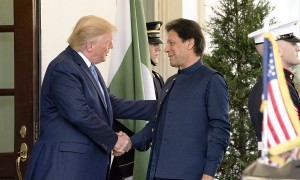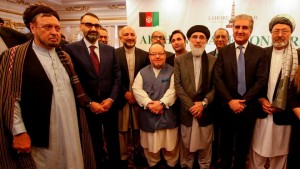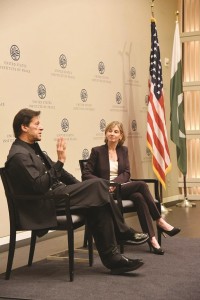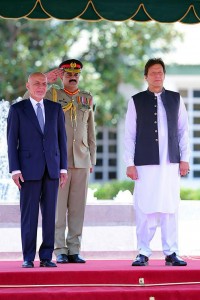Emerging Cordiality in PAK-US Relations
Dialogue is an absolute solution against war!
Hassaan Bin Zubair
Prime Minister Imran Khan’s visit to Unites States has earned international acclaim. US President Donald Trump’s warm reception of Khan and his delegation that included the country’s Chief of Army Staff General Qamar Javed Bajwa and the head of the Inter-Services Intelligence (ISI) Lt Gen Faiz Hameed, was highly appreciated in Pakistan. Offering reassurance that Pakistan would help US conclude a peace agreement with the Taliban that would effect US troops’ withdrawal from Afghanistan, PM Khan tried to rebuild Pakistan’s image in Washington that has been tarnished due to US suspicions against Pakistan. While there was no announcement that the United States would restore hundreds of millions of dollars in security assistance cut off last year. According to a senior analyst, the presence of the army chief, and ISI head alongside Khan was a strong signal that US mistrust of Pakistan’s security establishment had eased. By contrast, the US president managed to annoy India, with an unexpected offer to mediate in the decades-long dispute over Kashmir. In an exchange with the press, Trump said he would be willing to mediate the India-Pakistan dispute over Kashmir. It was a remark that surely didn’t go down well with America’s key partner India, which wants no external mediation whatsoever.
The United States has, for years, been doubtful about Pakistan’s commitment to the US-led war on terrorism, largely because of suspicion that Pakistan sees some militants, including the Afghan Taliban, as useful tools in its rivalry against India. Trump has also been suspicious of Pakistan. However, the need to reach a settlement with the Taliban to end more than 18-year-long military involvement in Afghanistan and Pakistan’s assurances that it would use its influence with the Taliban helped change the mood.
 Trump-Khan summit, which lasted several hours, appears to have gone swimmingly. It included not just a cordial one-on-one meeting, but also other high-level exchanges that included a working lunch featuring several Trump administration officials. Consequently, a relationship that had taken a deep plunge in previous months has resurfaced, and it now has the opportunity to be reenergized.
Trump-Khan summit, which lasted several hours, appears to have gone swimmingly. It included not just a cordial one-on-one meeting, but also other high-level exchanges that included a working lunch featuring several Trump administration officials. Consequently, a relationship that had taken a deep plunge in previous months has resurfaced, and it now has the opportunity to be reenergized.
Five key questions will, however, help determine the relationship’s trajectory in the aftermath of Khan’s meeting with Trump.
A constant challenge for US-Pakistan relations is a lack of trust. Though the two countries enjoyed a fairly strong Cold War-era partnership, the relationship in recent years has been beset by tensions that have inhibited trust. For the relationship to capitalize on the momentum set in motion by Khan’s visit, more high-level exchanges and more dialogue as a whole are of the essence. However, for the Trump administration, which favours transactional diplomacy over strategic dialogue, that’s a mighty tall order.
 Afghanistan was undoubtedly a core component of this rendezvous. For Washington, getting Islamabad to step up its assistance in current peace talks with the Taliban is a prime objective. These are demands the Taliban has so far categorically refused to accept. If Islamabad makes headway in this effort, the US-Pakistan relationship will receive a huge boost and an expansion of the relationship, into issues like trade and investment, could be in the offing. Still, the insurgents are negotiating from a position of strength; they are waging robust offensives and hold more territory than ever before.
Afghanistan was undoubtedly a core component of this rendezvous. For Washington, getting Islamabad to step up its assistance in current peace talks with the Taliban is a prime objective. These are demands the Taliban has so far categorically refused to accept. If Islamabad makes headway in this effort, the US-Pakistan relationship will receive a huge boost and an expansion of the relationship, into issues like trade and investment, could be in the offing. Still, the insurgents are negotiating from a position of strength; they are waging robust offensives and hold more territory than ever before.
The Trump administration has dangled the possibility of greater trade and economic cooperation with Pakistan, if sufficient progress is made in the areas of peace talks in Afghanistan. With Pakistan’s economy in a mess, any new US economic and trade support would be a major boon for a nation struggling through a serious balance of payments crisis. The Pakistanis have come to Washington ready to talk business; its large delegation includes Khan’s commerce adviser, and Khan’s itinerary includes meetings with top corporations. Some type of US-initiated confidence-building measure even something relatively modest, such as calling for an increased frequency of meetings under the Trade and Investment Framework Agreement (TIFA) could go a long way and may encourage more Pakistani cooperation in Afghanistan.
After the meeting between President Trump and PM Khan, the Pentagon notified the US Congress of its decision to approve military sales worth US$ 125 million that would result in 24/7 end-use monitoring of the F-16 fighter jets of Pakistan. The State Department, too, has made a determination approving a possible Foreign Military Sale to Pakistan for Technical Security Team (TST) in continued support of the F-16 program for an estimated cost of US$ 125 million. The Pentagon delivered the required certification notifying the US Congress of this possible sale. Pakistan has used the F-16 fighter jets against India, the latest being in the aftermath of the Balakot airstrike inside Pakistan by India.
In Pakistan, Prime Minister Imran Khan’s visit to the United States has been termed a resounding success. The visit, which a few months ago was not even a possibility, ended up giving’s Pakistan’s diplomacy a much-needed boost. For Islamabad, there are five major takeaways from Khan’s US visit.
First, a convergence of interests has emerged between Islamabad and Washington on both countries’ Afghanistan policy. Primarily, the focus of Khan’s meeting with Trump remained on Afghanistan. The last few months have seen Pakistan’s role being appreciated more by the US at the highest levels. This essentially shows that Trump’s close aides and team working on Afghanistan are pleased with Pakistan’s recent efforts. It is probable that after Khan’s visit Pakistan will position itself as a central player in the ongoing negotiations between the Taliban and the United States.
Second, on the question of terrorism there was not any serious criticism of Pakistan. It’s interesting to note that the issue of terrorism didn’t even become a major talking point in official meetings between the military as well as the civilian leadership. During his conversations at various forums, Khan made it clear that the country’s policy concerning the issue of terrorism had shifted radically. He also emphasized that there exists a civil-military agreement in Pakistan that “it’s in the interest of Pakistan to not allow militias” within the country. So far, Washington seems to endorse Pakistan’s stance on terrorism.
Third, an unexpected achievement that Islamabad was able to extract from Trump was the latter’s willingness to mediate between India and Pakistan. What made the situation worse for New Delhi was Trump’s reference to a conversation with India’s Prime Minister Modi, where the latter had asked for US mediation to resolve the issue of Kashmir. Trump’s statement, however, was denied by India within hours, with New Delhi maintaining that it doesn’t accept third-party intervention on the issue of Kashmir.
Fourth, the visit has offered bilateral security cooperation and military-to-military relations a much-needed boost. Last year, Trump suspended military training programs for Pakistan. They are likely to be reinstated soon. At one point during President Trump’s meeting with Khan, the former mentioned that the security assistance for Pakistan can come back depending on what both countries achieve concerning Afghanistan. Moreover, General Mark Milley, who has been nominated as the Chairman of the Joint Chiefs of Staff, said that US “interests are better served if the country maintains strong military ties with Pakistan.” It’s possible that Trump may resume Pakistan’s military training programs and exchanges which were suspended last year after both countries developed serious differences over the issue of Afghanistan.
 Finally, another major accomplishment for Pakistan is that Khan got along with Trump very well on a personal level. This is very important when it comes to this chequered bilateral relationship. Moreover, Khan’s recent meeting with Trump is likely going to set up a direct line of communication between the White House and Khan’s office, bypassing the thick bureaucracy on both sides. Essentially, this will help in terms of sidestepping hiccups that usually occur between the two countries when a direct line of communication is non-existent. It’s expected that Trump’s office would like to continue to remain in touch with Khan when it comes to progress concerning the Afghan peace process. Islamabad would like to use such an opportunity to sort out other issues in the bilateral realm.
Finally, another major accomplishment for Pakistan is that Khan got along with Trump very well on a personal level. This is very important when it comes to this chequered bilateral relationship. Moreover, Khan’s recent meeting with Trump is likely going to set up a direct line of communication between the White House and Khan’s office, bypassing the thick bureaucracy on both sides. Essentially, this will help in terms of sidestepping hiccups that usually occur between the two countries when a direct line of communication is non-existent. It’s expected that Trump’s office would like to continue to remain in touch with Khan when it comes to progress concerning the Afghan peace process. Islamabad would like to use such an opportunity to sort out other issues in the bilateral realm.
Above all, Khan’s visit has given Pakistan’s diplomacy a major public relations boost in Washington, which Islamabad fully intends to take advantage of. While it’s too early to predict the nature of Pakistan and the United States’ long-term relations, for the immediate term, Pakistan has scored a major win. I conclude this article in one-liner with my view point that “dialogue is the absolute solution against war!”
………………..
 Jahangir's World Times First Comprehensive Magazine for students/teachers of competitive exams and general readers as well.
Jahangir's World Times First Comprehensive Magazine for students/teachers of competitive exams and general readers as well.




